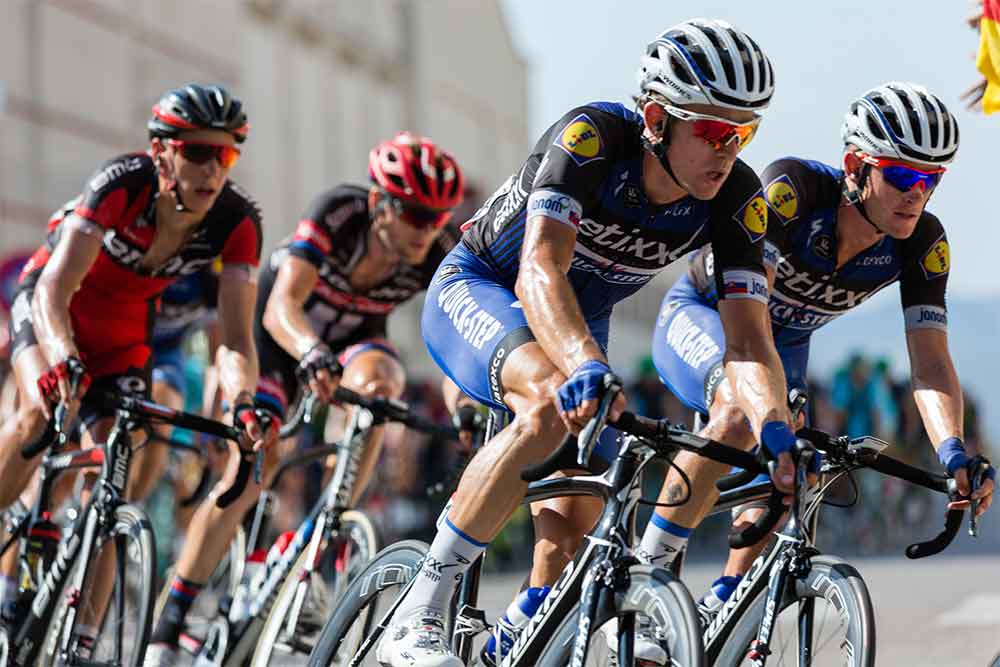Caffeine May Help or Hinder Athletic Performance

Most people have heard that caffeine enhances athletic performance, in fact, current guidelines recommend ingesting 3-9mg/kg 60 minutes prior to exercise. However, if you have ever tried it for yourself you might have found that the effects are negligible for you whereas your friend is able to exercise harder for a longer period of time. This is because there is a lot of inter-individual variability in caffeine ergogenicity; which means that people respond differently to caffeine.
A recent study explored the potential caused of this inter-individual variability response to caffeine ingestion with the aim of determining whether or not it is possible to create more personalized caffeine ingestion guidelines for athletes.
Caffeine
Caffeine (also known as Trimethylxanthine) is one of the most widely used performance enhancers among athletes. Between 1984 to 2004, caffeine was banned for in-competition use at high dosages. Since the removal of this ban, caffeine use has been recorded in at least 74% of athletes.
The reason caffeine is so widely used is because there is a good body of research suggesting that caffeine has performance enhancing effects. While is it not currently known exactly how caffeine affects athletic performance, it is believed to act as an adenosine receptor antagonist which reduces the effects of adenosine; a neurotransmitter that plays a role in preparing the body for sleep. In other words, caffeine prevents adenosine from decreasing arousal and nervous system activity, which ultimately makes people more alert.
By binding to the adenosine receptors caffeine can increase neurotransmitter release and the rate of muscle firing. This decreases the perception of pain, allowing people to exercise harder for a longer period of time. Currently the recommended dose is 3-9mg/kg 60 minutes prior to exercise for optimal effects, however, as we will see, this recommendation might change based on individual differences.
Related Article: Coffee: Fitness Friend or Foe?
Inter-individual Differences
The majority of research demonstrating the performance enhancing effects of caffeine have come to this conclusion by studying large groups of people and taking the average. However, if one were to take a closer look at the individual data it would be clear that the effects of caffeine differ for different people. For example, Jenkins et al. (2008) compared the effect of different doses of caffeine on athletic performance is 15 cyclists. Of the group, 4 individuals improved their times for all dosages while one person did not have any increase in performance for any dosage. This begs the question, what inter-individual differences exist that cause this variability in the ergogenicity (performance enhancing effect) of caffeine.
It’s All in Your Genes
The first hypothesis is that small changes in gene expression alter the speed at which caffeine is metabolized allowing for the effects to be experienced more quickly or more intensely. CYP1A2 is a gene that encodes the protein cytochrome p4501A2, which is responsible for 95% of caffeine metabolism. A change in just one nucleotide on this gene, which is seen in about 10% of the population), can slow down the breakdown of caffeine.
People who have this variation in their gene (CYP1A2*1F) are considered to be “slow metabolizers” while people who carry the normal version (CYP1A2*1A) are “fast metabolizers”. A study conducted by Womack et al. (2012) monitored the performance of participants biking 40km after ingesting either caffeine or a placebo. Within the “fast metabolizers” group, 15 of the 16 participants improved their times by at least 1 minute while only 10 out of the 19 participants in the “slow metabolizer” group saw improvements. The proposed mechanism through which this occurs is that when caffeine is broken down it is turned into metabolites (paraxanthine and theophylline) which are better at binding to the adenosine receptor and thus have an enhanced ergogenic effect.
So people who carry the “fast metabolizer” variation of the gene CYP1A2 can break down caffeine into metabolites more quickly.
ADORA2A Gene
Another gene that has recently gained some attention is ADORA2A; an adenosine receptor gene that plays a role in the down regulation of glutamate and dopamine. There are three variations of this gene; the C/T variation occurs in approximately 40% of the population while the T/T song C/C variations occur in 20-30%. It is currently thought that these variations play a role in caffeine induced anxiety with those with the T/T variation reporting higher levels of anxiety after ingesting caffeine.
A study that explored the link between this gene and caffeine ergogenicity had 12 females ingest 5mg/kg of either caffeine or placebo. Only 1 individual in the C/C and C/T group saw performance increases while all of the participants in the T/T group improved their times (Loy, O’Connor, Lindheimer, Covert, 2015). This is interesting because previous studies have found that the T/T variant is associated with higher levels of caffeine induced anxiety. Typically anxiety hinders performance but in this case it is possible that the T/T group participants perceived their symptoms of anxiety as increased arousal which helped them to perform better.
Related Article: Can Caffeine Improve Sprint Time In Elite Swimmers?
Environmental Factors
In addition to genetic differences, it has also been speculated that numerous environmental factors can influence the effect of caffeine. Things such as smoking, vegetable intake, menstrual cycle or training status can all have an effect on the body’s ability to metabolize caffeine. The majority of these non-genetic influences alter caffeine metabolism by increasing cytochrome p450 activity.
Other factors that can be controlled for in research trials include, age, method of ingestion, dosage, time of day and habitual caffeine use. Habitual use of caffeine alters the body’s physiological and cognitive response to caffeine dose. When caffeine is consumed on a regular basis, neurons within the brain produce more adenosine receptors. In this way, a person will have to ingest more caffeine to get a similar result.
Results from studies in this area are a little bit conflicting, but to the best of our knowledge, habitual caffeine use can decrease caffeine’s ergogenic effect. A study conducted in 2017, 18 mild caffeine users were assigned to receive either daily caffeine supplementation or placebo for 28 days. Following this period, all participants ingested 3mg/kg of caffeine prior to completing a 60 minute cycling workout. The group that had been assigned daily caffeine supplementation had a 7.3% reduction in performance compared to their pre-intervention trial. These results suggest that habitual caffeine use diminishes, but does not eliminate, caffeine’s ergogenic effect (Beaumont, Cordery, Funnell, Mears, James, Watson, 2017).
How Our Own Brain Plays A Role
Interestingly, our own brain can also affect the ergogenicity of caffeine. Many studies have found that our expectancies surrounding the effects of caffeine play a role in what the actual effects will be. A study conducted in 2016 gave participants either 6mg/kg of caffeine, a placebo or nothing. Those who correctly identified that they had been given caffeine had a greater performance enhancement than the overall caffeine trail. Similarly, those who believe they were getting caffeine but actually relieved a placebo also increased their performance compared to those who correctly guessed that they were receiving a placebo (Saunders et al., 2016).
Where is the Research Heading
With all of this in mind, it is important to remember that this field of research is relatively new and there is still a considerable amount of research to be done before any conclusions can be drawn regarding the inter-individual variation of caffeine’s ergogenic effect. The exciting thing is that, with the rise of genetic profiling technology, it will be possible to determine if you have the “fast metabolizer”, or T/T variation of genes. Paired with knowledge of individual variation in environmental factors, expectancies and habitual caffeine use it is possible for practitioners, dietitians and nutritionists to develop more personalized guidelines surrounding caffeine intake for athletes.
So should we all be ingesting loads of caffeine before competitions? The best research says probably not. In fact, there are many negative effects that can occur when caffeine is ingested in large quantities. Overstimulation can result in nausea, shaking and increased heart rate, none of which will be helpful during a competition. Furthermore, through its actions on adenosine receptors, caffeine may decrease the production of erythropoietin; a hormone responsible for the production of red blood cells. With fewer red blood cells, the body is unable to carry oxygen as efficiently. There is also the concern of withdrawal symptoms in habitual users which include headache, fatigue and insomnia.
Takeaway
In conclusion, caffeine has been shown to increase athletic performance in many individuals. Unfortunately, the only way to determine if it will work for you is to either have genetic testing done to look for the “fast metabolizer” CYPA1A2*1A gene or the T/T variant of the ADORA2A gene. So, the current recommendation would be trial and error; ingest 3-9mg/kg of caffeine prior to a workout or competition and see how it affects your performance.
If you feel as though you are able to exercise for longer without getting as tired, or maybe you are able to increase the intensity of your HIIT workout than caffeine might be doing the trick for you. However, if you feel anxious, have an unusually fast heart beat, are getting muscle cramps or feel nauseous, then you might be a “slow metabolizer” and thus caffeine is not your best friend. At the end of the day, do what feels right for your body, but when reaching for the caffeine supplement, make sure it contains less than 9mg/kg to avoid the potential negative side effects of caffeine overstimulation.
You Might Like:
Caffeine May Help or Hinder Athletic Performance
Most people have heard that caffeine enhances athletic performance, in fact, current guidelines recommend ingesting...Could a Carb Mouth Rinse Be the Next Best Performance Booster?
Evan Stevens The last thing an athlete wants is to feel like they have no...Can Caffeine Improve Sprint Time In Elite Swimmers?
A Review by Alyssa Bialowas Caffeine is an ergogenic aid, meaning it’s a substance that...Coffee: Fitness Friend or Foe?
Adriane Cook B.S. Kinesiology, Michigan State University www.balancewithme.com Nothing quite unites a country like its...References
Jenkins NT, Trilk JL, Singhal A, O’Connor PJ, Cureton KJ. Ergogenic effects of low doses of caffeine on cycling performance. Int J Sport Nutr Exerc Metab. 2008;18(3):328–42
Beaumont R, Cordery P, Funnell M, Mears S, James L, Watson P. Chronic ingestion of a low dose of caffeine induces tolerance to the performance benefits of caffeine. J Sports Sci. 2017;35(19):1920–7.
Daly JW, Butts-Lamb P, Padgett W: Subclasses of adenosine receptors in the central nervous system: interaction with caffeine and related methylxanthines. Cell Mol Neurobiol. 1983, 3: 69-80. 10.1007/BF00734999.
Cornelis MC, El-Sohemy A, Kabagambe EK, Campos H. Coffee, CYP1A2 genotype, and risk of myocardial infarction. Jama. 2006 Mar 8;295(10):1135-41.
References continued
Womack CJ, Saunders MJ, Bechtel MK, Bolton DJ, Martin M, Luden ND, Dunham W, Hancock M. The influence of a CYP1A2 polymorphism on the ergogenic effects of caffeine. J Int Soc Sports Nutr. 2012;9(1):7.
Urry E, Landolt HP. Adenosine, caffeine, and performance: from cognitive neuroscience of sleep to sleep pharmacogenetics. In: Meerlo P, Benca RM, Abel T, editors. Sleep, neuronal plasticity and brain function. Berlin: Springer; 2014. p. 331–66.
Ribeiro JA, Sebastiao AM. Caffeine and adenosine. J Alzheimer’s Dis. 2010;20(S1):3–15.
Kalmar JM. The influence of caffeine on voluntary muscle activation. Med Sci Sports Exerc. 2005;37(12):2113–9.
Graham TE. Caffeine and exercise: metabolism, endurance and performance. Sports Med. 2001;31(11):785–807.
Gonglach AR, Ade CJ, Bemben MG, Larson RD, Black CD. Muscle pain as a regulator of cycling intensity: effect of caffeine ingestion. Med Sci Sports Exerc. 2016;48(2):287–96.
Laurent D, Schneider KE, Prusaczyk WK, Franklin C, Vogel SM, Krssak M, Petersen KF, Goforth HW, Shulman GI. Effects of caffeine on muscle glycogen utilization and the neuroendocrine axis during exercise. J Clin Endocrinol Metab. 2000;85(6):2170–5.
References Continued
Brooks JH, Wyld K, Chrismas BC. Caffeine supplementation as an ergogenic aid for muscular strength and endurance: a recommendation for coaches and athletes. J Athl Enhanc. 2016;5(4). doi:10.4172/2324-9080.1000235.
Del Coso J, Mun ̃oz G, Mun ̃oz-Guerra J. Prevalence of caffeine use in elite athletes following its removal from the World Anti- Doping Agency list of banned substances. Appl Physiol Nutr Metab. 2011;36(4):555–61.
Gu L, Gonzalez FJ, Kalow W, Tang BK. Biotransformation of caffeine, paraxanthine, theobromine and theophylline by cDNA- expressed human CYP1A2 and CYP2E1. Pharmacogenetics. 1992;2(2):73–7.
Sachse C, Brockmo ̈ller J, Bauer S, Roots I. Functional significance of a C-A polymorphism in intron 1 of the cytochrome P450 CYP1A2 gene tested with caffeine. Br J Clin Pharmacol. 1999;47(4):445–9.
Cornelis MC, El-Sohemy A, Campos H. Genetic polymorphism of the adenosine A2A receptor is associated with habitual caffeine consumption. Am J Clin Nutr. 2007;86(1):240–4.
Byrne EM, Johnson J, McRae AF, Nyholt DR, Medland SE, Gehrman PR, Heath AC, Madden PA, Montgomery GW, Che- nevix-Trench G, Martin NG. A genome-wide association study of caffeine-related sleep disturbance: confirmation of a role for a common variant in the adenosine receptor. Sleep. 2012;35(7):967–75.
References continued
Retey JV, Adam M, Khatami R, Luhmann UF, Jung HH, Berger W, Landolt HP. A genetic variation in the adenosine A2A receptor gene (ADORA2A) contributes to individual sensitivity to caffeine effects on sleep. Clin Pharmacol Ther. 2007;81(5):692–8.
Loy BD, O’Connor PJ, Lindheimer JB, Covert SF. Caffeine is ergogenic for adenosine A2A receptor gene (ADORA2A) T allele homozygotes: a pilot study. J Caffeine Res. 2015;5(2):73–81.
Saunders B, Oliveira LF, Silva RP, Salles Painelli V, Gonc ̧alves LS, Yamaguchi G, Mutti T, Maciel E, Roschel H, Artioli GG, Gualano B. Placebo in sports nutrition: a proof-of-principle study involving caffeine supplementation. Scand J Med Sci Sports. 2016;. doi:10.1111/sms.12793.
Ling C, Groop L. Epigenetics: a molecular link between environmental factors and type 2 diabetes. Diabetes. 2009;58(12):2718–25.
Moran CN, Pitsiladis YP. Tour de France Champions born or made: where do we take the genetics of performance? J Sports Sci. 2017;35(14):1411–19.
References continued
Buscariollo DL, Fang X, Greenwood V, Xue H, Rivkees SA, Wendler CC. Embryonic caffeine exposure acts via A1 adenosine receptors to alter adult cardiac function and DNA methylation in mice. PloS One. 2014;9(1):e87547.
Ping J, Wang JF, Liu L, Yan YE, Liu F, Lei YY, Wang H. Prenatal caffeine ingestion induces aberrant DNA methylation and histone acetylation of steroidogenic factor 1 and inhibits fetal adrenal steroidogenesis. Toxicology. 2014;321:53–61.
Wendler C, Poulsen R, Fang X. Caffeine induces both short-term and long-term effects on gene expression and DNA methylation in the mouse heart. FASEB. 2014;28(1 Supplement):542–3.
Hammons GJ, Yan-Sanders Y, Jin B, Blann E, Kadlubar FF, Lyn- Cook BD. Specific site methylation in the 50-flanking region of CYP1A2: Interindividual differences in human livers. Life Sci. 2001;69(7):839–45.
Jin B, Park DW, Nam KW, Oh GT, Lee YS, Ryu DY. CpG methylation of the mouse CYP1A2 promoter. Toxicol Lett. 2004;152(1):11–8.












